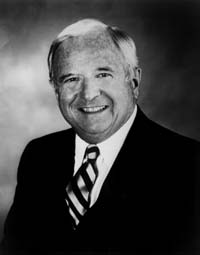William F. Ludwig II
by J. J. Rusch
"It is the culmination of a lifetime"the highest award in 'percussiondom'"I can finally die," says William F. Ludwig II of his induction to the PAS Hall of Fame. Though the PAS membership is composed of players, educators, students and industry people, Ludwig is overwhelmed about his election because, "Most of the people in the Hall of Fame are there for playing."
 Ludwig has worked in the music business for over 50 years. He is articulate and quick-witted, and his presence is as commanding as his professional stature.
Ludwig has worked in the music business for over 50 years. He is articulate and quick-witted, and his presence is as commanding as his professional stature.
Ludwig says his mostmemorable moment, aside from family concerns, was winning the National Solo Drum Competition in 1933. "No, cancel that," he said a few hours before the PASIC '93 Hall of Fame banquet. "It was my bid to buy back the Ludwig name from Conn in 1955 - against my father's wishes. My father sold the company in 1929 because of what happened on October 15, 1927. It was all Al Jolson's fault," he said, referring to the first motion picture to feature sound. "The company lost its customer base almost overnight. There was no need for live music in the movie theaters anymore."
At that time, the company couldn't rely on steady sales of student-line instruments, as public school music curriculums were still in the planning stage. "School music programs were just beginning to form in the very late '20s," Ludwig said. "It began with a gradual coming together of the educators themselves, who formed an association that sponsored solo and ensemble contests. This was when parents only rented their children's instruments because the schools wouldn't buy them. In addition to the contests, music camps were also organized. School administrators soon recognized the value of these promotions in that their town names would be seen all over the area. That is when they finally decided to participate.
"So the only customers my dad had after Jolson were the single players, and there weren't enough of them to sustain the business. He decided to sell the company in October of 1929, and two weeks later the stock market crashed." Ludwig II eventually bought the company back while his father was out of town. "I was so excited when I called him," Bill recalls. "As soon as he answered, I said, ‘Hello Mr. President of Ludwig Drum Company.' But he was mad as hell at me. He said, ‘You mean you bought it back? Are you nuts? You'll drive us into bankruptcy!' But you know what? Two years later my father told me it was a good decision."
Ludwig says that the value of a name is far more important than its sale price, but admits that he ultimately surprised himself. "I turned around 30 years later and did the very same thing when I sold the company to Selmer. Sometimes you have to make a business decision when you don't necessarily want to."
William F. Ludwig II began playing drums at age eight, receiving early lessons from his father. He played percussion throughout his school years, and in college served as solo timpanist with the University of Illinois Concert Band. At the University, he was enrolled in the School of Business Economics.
He joined the Ludwig Drum Company in 1938, and except for 3 1/2 years of war service, guided its growth until the sale to Selmer. In 1940 he authored an instructional book, Modern Dance Drumming (formerly Swing Drumming), which is still included in many teaching lists and published in two languages. He also wrote many of the Ludwig Drum Company catalogs and brochures.
During the 1960s, he guided Ludwig Industries through its greatest growth period, which resulted in major building expansions and the acquisition of several companies, including the Musser Marimba Company. He was named president of Ludwig Industries in 1973 following the death of the founder, William F. Ludwig, Sr.
After 45 years in the business, William F. Ludwig II is recognized as a leading authority in the manufacture of all types of percussion instruments, and guardian of the Ludwig family heritage, including the most extensive museum of early drums dating from the Revolutionary War. He also collects percussion patents, having accumulated and cataloged every American drum and accessory patent ever issued by the United States Patent Office, beginning with the Zimmerman percussion patent of 1858.
Today, nothing seems to delight Ludwig more than seeing kids enthused about music. "They are the industry's future," he says, adding that his advice to any young drummer is basic: "Study and play in time FIRST. A lot of successful jazz drummers were tap dancers. Buddy Rich always used to say, ‘I don't play drums, I dance on them. It's all in the feet.' I asked Louie Bellson about it and he agreed; he knew how to tapdance too. Today, it's the other way around. There are hundreds of books out on the hands, but none on the feet!"
He is not enthusiastic when it comes to electronics and drums. "Beware of anything you plug into the wall," he advises. "Drummers shouldn't be computer programmers. There's nothing like the sound of a real drum. I think the whole electric drum thing will collapse." His personal philosophy is a simple one. "No matter what, you always have to be prepared for what you're going to do," Ludwig said, reaching into his pocket and pulling out a single sheet of yellow notebook paper that contained eight handwritten points noted in single sentences on the page - his only guideline for that night's Hall of Fame acceptance speech.
William F. Ludwig II has lived through wars and depressions, rebuilt and sold a music empire, and now lectures extensively on the history of drums. No matter what endeavor he pursues, he is always - at the very least - prepared to do so.